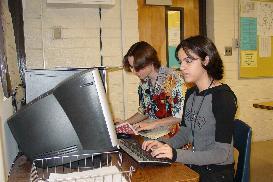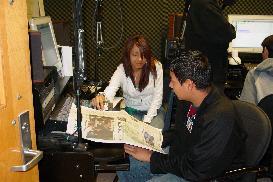
Thursday Jan 27, 2011
Best overview of Writing in Stereo curriculum and methods applied to video
A video colleague of mine teaching in St. Louis recently wrote me for advice on curriculum. I share this advice with you because it's a very coherent overview of the program as I taught it at Pueblo Magnet High School in Tucson, Arizona.
Your curriculum is in three places on my blog, //writinginstereo.podbean.com. Here under Writing in Stereo II. Here under MicWriter. And here under MicWriter on Video.To discuss this with me, write me at writinginstereo@gmail.com. I look forward to hearing from you.Here's how this evolved. When I taught it for my broadcast journalism for radio classes, I taught the Writing in Stereo II sequence just as you see it there. (Exception being the Voicer. We never had use for it, so I breezed over it and moved on.) Since I've retired, I've reconsidered the piecemeal approach and decided presenting the whole package (video) model first and then breaking it down for the students' lessons made more sense. That way they'd know where they were going. You could show them a perfect example of a short video package and walk them through the MicWriter model as it applies. Then teach the lessons, starting with the Reader. (Take a look at MicWriter on Video. You'll see there how little you have to add to the radio curriculum. The writing style is exactly the same.)
How do you get the daily announcements? Do you get a copy in your mailbox first thing in the morning, last thing the previous afternoon? A few years before I retired, our faculty email had totally replaced our school's daily announcements. I was just copying the appropriate faculty emails for print copy to rewrite to broadcast style. Then we kept them in chronological order (that is day/date order) on the table. We'd read their broadcast rewrites on the first day they appeared and then again the day before and the day of. These are usually meeting announcements or those of events to happen "next week." Including the same rewrite day after day for a week (or two) serves no purpose. The listeners can't absorb it all, and your faculty will get tired of hearing it. This, of course, is up to you. If you're word processing, there's little to rewrite either way.
Once your Advanced (first kids to learn it) students are well-practiced on the reader, you're ready to do some practice newscasts. These will be dry runs with the actual announcement copy to rewrite. In radio we paired students in teams for the year (semester, if you prefer) and had them rotating weekly through stations according to a wall pocket chart. One pair would rewrite new school announcements and assemble the copy for the program. Another pair were rewriting our school angle world, national, state and local stories--I provided them one each. We had a pair putting together the sports news from the school announcements. Other pairs were on stations in production (recording and editing), news phoner/wraparound (your package, editing) and on the air (deejays). Again, these station assignments rotated weekly. Once they have the writing style down, it's pretty much an "Okay, roll's taken, get to work." kind of class. You sweat during the last ten minutes, when copy needs to be delivered or a phoner isn't quite ready to air on time. (forced smile) But the broadcast goes up at the beginning of second period, and those students who remain from first to do that get a note to their second period class. We record it for airing hourly via our broadcast automation software. (I translate it to MP3 for that insertion.) And we do it all over again third, fifth and sixth periods. The Beginning class concentrates on the writing style for most of the first semester. You hope to get them into the routine above before Christmas, I should think. You should have many questions. I look forward to clarifying.
 Here's how this evolved. When I taught it for my broadcast journalism for radio classes, I taught the Writing in Stereo II sequence just as you see it there. (Exception being the Voicer. We never had use for it, so I breezed over it and moved on.) Since I've retired, I've reconsidered the piecemeal approach and decided presenting the whole package (video) model first and then breaking it down for the students' lessons made more sense. That way they'd know where they were going. You could show them a perfect example of a short video package and walk them through the MicWriter model as it applies. Then teach the lessons, starting with the Reader. (Take a look at MicWriter on Video. You'll see there how little you have to add to the radio curriculum. The writing style is exactly the same.)
Here's how this evolved. When I taught it for my broadcast journalism for radio classes, I taught the Writing in Stereo II sequence just as you see it there. (Exception being the Voicer. We never had use for it, so I breezed over it and moved on.) Since I've retired, I've reconsidered the piecemeal approach and decided presenting the whole package (video) model first and then breaking it down for the students' lessons made more sense. That way they'd know where they were going. You could show them a perfect example of a short video package and walk them through the MicWriter model as it applies. Then teach the lessons, starting with the Reader. (Take a look at MicWriter on Video. You'll see there how little you have to add to the radio curriculum. The writing style is exactly the same.)
 How do you get the daily announcements? Do you get a copy in your mailbox first thing in the morning, last thing the previous afternoon? A few years before I retired, our faculty email had totally replaced our school's daily announcements. I was just copying the appropriate faculty emails for print copy to rewrite to broadcast style. Then we kept them in chronological order (that is day/date order) on the table. We'd read their broadcast rewrites on the first day they appeared and then again the day before and the day of. These are usually meeting announcements or those of events to happen "next week." Including the same rewrite day after day for a week (or two) serves no purpose. The listeners can't absorb it all, and your faculty will get tired of hearing it. This, of course, is up to you. If you're word processing, there's little to rewrite either way.
How do you get the daily announcements? Do you get a copy in your mailbox first thing in the morning, last thing the previous afternoon? A few years before I retired, our faculty email had totally replaced our school's daily announcements. I was just copying the appropriate faculty emails for print copy to rewrite to broadcast style. Then we kept them in chronological order (that is day/date order) on the table. We'd read their broadcast rewrites on the first day they appeared and then again the day before and the day of. These are usually meeting announcements or those of events to happen "next week." Including the same rewrite day after day for a week (or two) serves no purpose. The listeners can't absorb it all, and your faculty will get tired of hearing it. This, of course, is up to you. If you're word processing, there's little to rewrite either way.
 Once your Advanced (first kids to learn it) students are well-practiced on the reader, you're ready to do some practice newscasts. These will be dry runs with the actual announcement copy to rewrite. In radio we paired students in teams for the year (semester, if you prefer) and had them rotating weekly through stations according to a wall pocket chart. One pair would rewrite new school announcements and assemble the copy for the program. Another pair were rewriting our school angle world, national, state and local stories--I provided them one each. We had a pair putting together the sports news from the school announcements. Other pairs were on stations in production (recording and editing), news phoner/wraparound (your package, editing) and on the air (deejays). Again, these station assignments rotated weekly. Once they have the writing style down, it's pretty much an "Okay, roll's taken, get to work." kind of class. You sweat during the last ten minutes, when copy needs to be delivered or a phoner isn't quite ready to air on time. (forced smile) But the broadcast goes up at the beginning of second period, and those students who remain from first to do that get a note to their second period class. We record it for airing hourly via our broadcast automation software. (I translate it to MP3 for that insertion.) And we do it all over again third, fifth and sixth periods.
The Beginning class concentrates on the writing style for most of the first semester. You hope to get them into the routine above before Christmas, I should think.
You should have many questions. I look forward to clarifying.
Once your Advanced (first kids to learn it) students are well-practiced on the reader, you're ready to do some practice newscasts. These will be dry runs with the actual announcement copy to rewrite. In radio we paired students in teams for the year (semester, if you prefer) and had them rotating weekly through stations according to a wall pocket chart. One pair would rewrite new school announcements and assemble the copy for the program. Another pair were rewriting our school angle world, national, state and local stories--I provided them one each. We had a pair putting together the sports news from the school announcements. Other pairs were on stations in production (recording and editing), news phoner/wraparound (your package, editing) and on the air (deejays). Again, these station assignments rotated weekly. Once they have the writing style down, it's pretty much an "Okay, roll's taken, get to work." kind of class. You sweat during the last ten minutes, when copy needs to be delivered or a phoner isn't quite ready to air on time. (forced smile) But the broadcast goes up at the beginning of second period, and those students who remain from first to do that get a note to their second period class. We record it for airing hourly via our broadcast automation software. (I translate it to MP3 for that insertion.) And we do it all over again third, fifth and sixth periods.
The Beginning class concentrates on the writing style for most of the first semester. You hope to get them into the routine above before Christmas, I should think.
You should have many questions. I look forward to clarifying.
No comments yet. Be the first to say something!